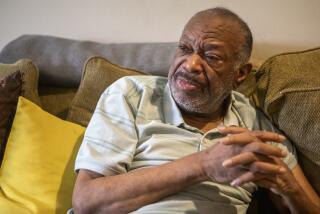L.A. attorney pioneered the field of healthcare law
- Share via
James E. Ludlam, one of the founders of healthcare law who helped shape California’s healthcare environment during the last half of the 20th century, has died. He was 93.
Ludlam, who has been called the “dean” and the “godfather” of healthcare lawyers, died Tuesday in the nursing facility at the Pasadena retirement home where he lived, said his son, Chuck. The cause of death was not known.
“He’s kind of acknowledged as the individual that founded the specialty of healthcare law,” J. Robert Liset, a longtime partner of Ludlam who heads the healthcare practice at Musick, Peeler & Garrett in Los Angeles, told The Times last week. “He’s been a real driver and force in the industry.”
Liset said Ludlam probably will be best remembered as one of the principal authors of the Medical Injury Compensation Reform Act of 1975, which alleviated a crisis in California because physicians were leaving the state and giving up their practices over prohibitively high malpractice insurance premiums caused by huge jury awards.
The landmark legislation, which brought down malpractice insurance premiums in California and, among other things, set a limit of $250,000 on damages for pain and suffering, is considered a national model for tort reform.
A 1939 Harvard Law School graduate, Ludlam was given his first healthcare case in January 1940: handling a complicated tax matter for what is now Long Beach Memorial Medical Center.
The assignment came on the same day he passed the California bar exam and reported for work at the law firm now known as Musick, Peeler & Garrett and where he remained throughout his career.
Beginning with that first case, Ludlam became a leader in efforts to strengthen the tax-exempt status of nonprofit hospitals and launched a nearly 70-year career in the field of healthcare law.
Ludlam, according to a 2002 article in Modern Healthcare, handled “thousands of healthcare cases and clients, almost single-handedly creating a legal specialty that is now so highly populated by busy lawyers he joked about having his own personal alumni association.”
“When he started practicing in 1940, there was no specialty of healthcare law,” Liset said. “It was lawyers who served on boards of directors of hospitals who did the work pro bono. Now, for example, the national Health Lawyers Assn. has grown to 10,000 members.”
Recalling his early work in healthcare law in a 1995 interview with the New York Times, Ludlam said, “Hospitals were represented like churches; it was pro bono work. Because of the amount of time I spent on it, I established the pattern of being paid for it.”
In a 2002 interview with Modern Healthcare, Ludlam, then 87 and still putting in a number of voluntary hours at the law firm where he launched his career more than 60 years earlier, recalled, “You only had a relatively few hospitals back in those days. Back then, you didn’t have organized medical groups or integrated medical groups. You didn’t have Medicare or Medicaid.
“It was just a hell of a lot simpler back then. Now a hospital has every legal problem that a business has -- plus a medical staff, which complicates things very much.”
Ludlam served as general counsel to the California Hospital Assn. and was its advocate and spokesman on legislative and policy issues from 1954 to 1984.
He also served as secretary and general counsel to Blue Cross of Southern California for 30 years and was general counsel to the Hospital Council of Southern California (now called the Healthcare Assn. of Southern California) for nearly 40 years.
In 1967, Ludlam was among four lawyers who founded the Society of Hospital Attorneys, a precursor of the American Health Lawyers Assn.
“Without his leadership, our members certainly would not have the same rich specialty in which to earn their living and contribute to society,” Peter Leibold, executive vice president and chief executive of the American Health Lawyers Assn., wrote in an e-mail last week to the association’s past presidents, board and fellows.
Ludlam, author of a 1998 book chronicling the history of the development of healthcare policy in California, “Health Policy -- The Hard Way,” received numerous honors over the years, including Leadership in Health Affairs, the highest honor from the Hospital Council of Southern California.
“Healthcare is a cause; at least it became a cause for me. And that’s the way most people in this industry feel. It’s really been a great career,” Ludlam told Modern Healthcare in 2002 after he was inducted into the Modern Healthcare Hall of Fame at Pennsylvania Hospital in Philadelphia.
Ludlam was born Nov. 26, 1914, in Portland, Ore., and moved with his family to San Francisco as a young child.
He graduated from Stanford University in 1936 and from Harvard Law School in 1939. He served in the Navy for three years during World War II.
He met his wife, Jane, in Munich, Germany, in 1938, and they were married in 1941. She died in 2002.
Ludlam continued to work on healthcare policy until about a month before he died, serving on the boards of the Good Hope Medical Foundation, the House Ear Institute and the National Health Foundation.
In addition to his son Chuck, Ludlam is survived by his son Ted, two grandchildren and two great-grandchildren.
Services will be private.
Memorial donations may be made to the House Ear Institute, c/o James Boswell, chief executive, 2100 W. 3rd St., Los Angeles, CA 90057; the National Health Foundation, c/o Gene Grigsby, president, 515 S. Figueroa St., Suite 1300, Los Angeles, CA 90071; or the California Hospital Medical Center Foundation, c/o Cliff Hoffman, president, 1401 S. Grand Ave., Los Angeles, CA 90015.
--
More to Read
Sign up for Essential California
The most important California stories and recommendations in your inbox every morning.
You may occasionally receive promotional content from the Los Angeles Times.










